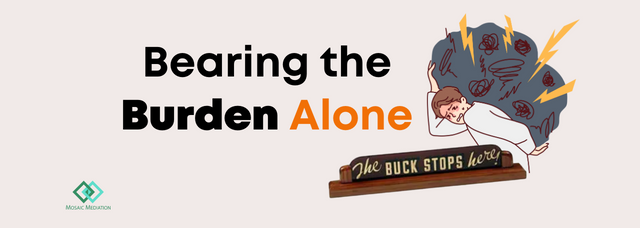Bearing the Burden Alone
What mechanisms have you put in place to lighten the load?

It’s lonely at the top – whether you are the main decision-maker in your business, a volunteer group or in your home life.
Did you know that the phrase ‘the buck stops here’ was popularised when U.S. president Harry S. Truman had a sign on his desk with 'The buck stops here' inscribed on it? This was meant to indicate that he didn't 'pass the buck' to anyone else but accepted personal responsibility for the way the country was governed.
One of the things that I have noticed about leaders who take their responsibility seriously is that they can respond in a couple of different ways:
1. Get burned out – whether because they take too much on or haven’t managed their priorities effectively.
2. Make fear-driven decisions – to avoid any potential risks that have become all too prominent in their mind.
3. They put together a support system – for both their practical and psychological needs.
The Frazzled Leader
As we all know, burnout serves nobody. You may at the beginning be able to still be productive and creative but in a short time, the cracks will start to show. As with all of the options, the intention behind these behaviours is positive – they want to get things done! However, if someone is trying to do everything, then sometimes even the things that they care about get forgotten or get negatively impacted.
The Over-Protective Leader
When decisions are driven by fear – based on what they have experienced/witnessed happening before, fear of failure, or the unknown potential risks – then a leader will only take the ‘safe’ option or there is a tendency towards avoidance. I see this kind of avoidance regularly when mediating. As an example, from good intentions (not wanting to offend, being willing to over-accommodate others out of selflessness, or not wanting to highlight something which could create tension) leaders might care so much about the feelings of their staff members that they avoid giving constructive feedback. Or they go with the opinion of the most confident person in the room – if they’re that confident, it’s got to be a good idea, right?!
The Pro-Active Leader
They’ve either seen the above two situations before, or they have the wisdom to realise they need to put a mechanism in place which supports their leadership. It’s no wonder that you always see great leaders surrounded by a support team! That’s a heavy burden to bear alone.
This mechanism may be done by having clever systems and processes to minimise unnecessary or unproductive tasks. It may be in the form of the team they have in their organisation, whose roles and giftings complement their own gifts and the needs of the organisation.
It may also be in who they have around them external to the organisation. They may proactively invest and nurture their personal relationships so that they have a partner who supports them through life or a friendship group that they can trust to speak with confidentially and who give them kind and honest feedback. Or, they may have paid specialists to contribute to growth in skills, confidence or emotional intelligence – such as a therapist, a mentor or a coach.
I both love and am challenged by this quote from Harvey Ullman:
“Anyone who stops learning is old, whether this happens at twenty or eighty. Anyone who keeps on learning not only remains young, but becomes constantly more valuable regardless of physical capacity.”
This kind of leader pays attention to where there are areas of growth that require some focussed action and is regularly reviewing whether the methods of working need adjustment and whether the working relationships (or personal) require any adapted behaviours.
They ensure that there are a small group of people to who they can talk in total confidence, perhaps to who they can vent or seek advice.
When you are a leader in your business, there will be many situations that you have never encountered before, so it helps to know others who may have experienced similar situations. It may not be helpful to emulate how they responded precisely but to learn from what happened and their takeaways from that experience.
And, sometimes a leader just needs someone to listen without any potential repercussions or judgement!
Sometimes my clients apologise for venting their frustrations with me – even when they know that’s often part of my process. But, they are also so very grateful that their words will not leave the session. Many often find that having that space to vent allows them to realise what they actually think (which may be very different from what they initially said!).
Through mediating for the past 7 years and providing a coaching service to individuals in leadership roles, I can see just how much clarity and empowerment a person gets from talking through ideas and having a safe space to say whatever they need to. To be asked curious questions which get them thinking, reflecting, discovering their own solutions, and feeling ready to take action.
Whether you are a leader in a community group, family set-up, or business, the same principles apply – if you want to be a proactive AND accountable leader, make sure you have put the right people and task-management mechanisms in place to support you in that role. So, you don’t feel like you are bearing the full burden alone.
For more information on coaching or how you can develop the skills to empower you as a decision-maker and leader in your life, check out the coaching and training (workshops and individual e-learning) pages on the website.










